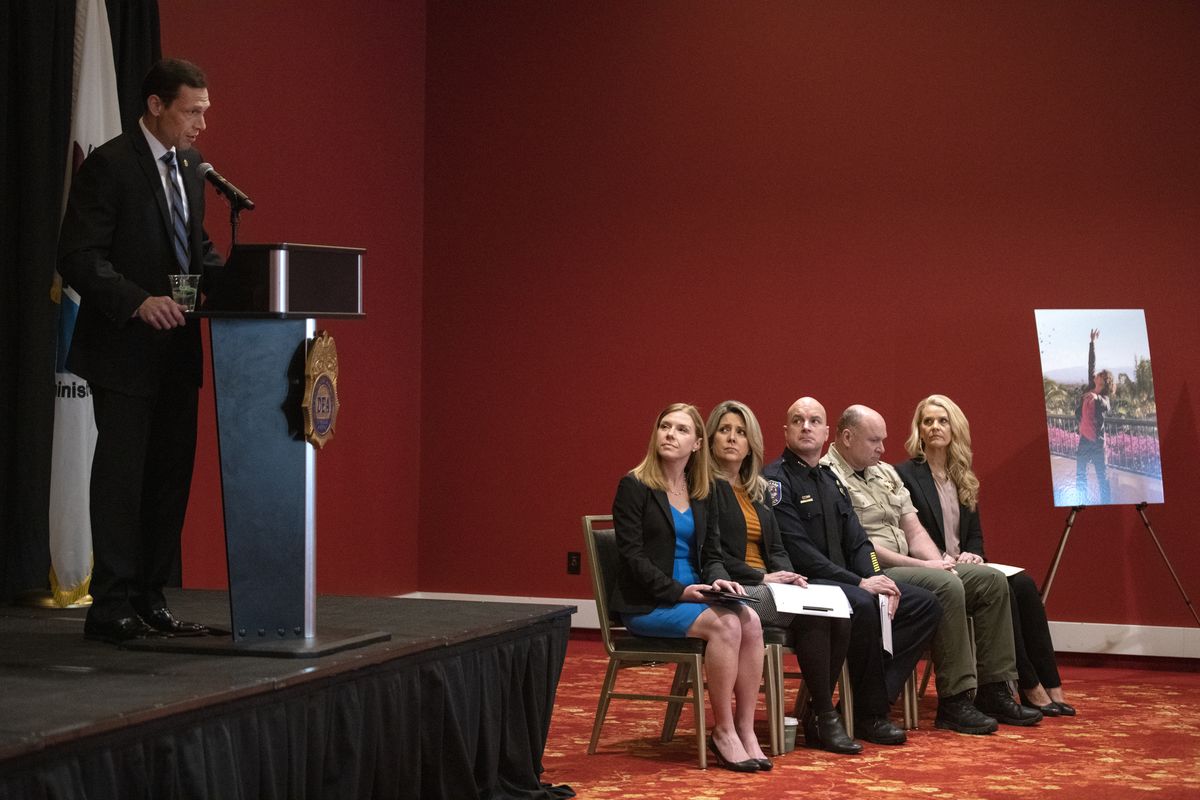Spokane designated by federal law enforcement as a crisis spot for fentanyl addiction after seizures increase 1,100%

When Freeman High School graduate Rayce Rudeen was away from his Seattle apartment while undergoing opioid addiction treatment, his family found dozens of illicit pills ordered directly from the internet.
“It all began with him looking for herbs for his anxiety,” Marsha Malsam, Rudeen’s aunt, said during a news conference in Spokane on Tuesday. “It ended with us finding fentanyl in every envelope or package, or even in the heels of the shoes in his apartment.”
Rudeen returned home after treatment in 2016, but the peace was quickly broken. He overdosed and died three weeks later, his aunt said, one of the hundreds of deaths from synthetic opioid overuse that have occurred in Washington over the past several years. The scourge is especially prevalent in Spokane County, with overdose deaths nearly tripling in 2021 compared with the year prior, and the federal Drug Enforcement Administration has named the region as one of its 11 emphasis areas this year to combat local drug crimes.
Frank Tarentino, special DEA agent in charge of the Seattle Field Division, called fentanyl “a clear and present threat” to the community, with trafficking driven by massive profit margins. The drug, a lab-made opioid that is anywhere from 60 to 100 times more potent than morphine, may be cut with other drugs and pressed into authentic-looking pills that hide their deadly potential.
“This is a business,” Tarentino said. “It is a half-a-trillion-dollar-a-year business driven by greed.”
Federal drug enforcement officials have stepped up enforcement efforts, seizing 15,000 pounds of pure fentanyl in 2021. That’s enough to apportion a lethal dose to every single American, Tarentino said, and that’s just what has been seized across the country.
The federal government has selected 11 sites for Operation Engage, which Tarentino said connects DEA offices with schools, faith-based organizations, social service providers and other community organizations. Each of those cities, which include such locations as Washington D.C., Kansas City and Broward County in Florida, lists opioids, and fentanyl, as a drug of concern.
In Spokane County, seizures of fentanyl increased 1,098%, the DEA says.
Spokane County Sheriff Ozzie Knezovich applauded efforts to bring attention to the fentanyl issue, but noted it was the latest in a long line of drugs he’s seen ravage the community, beginning with methamphetamine and then moving on to prescribed opioids and, finally, the synthetic kind that are in many instances smuggled across the Mexican border.
“America has an addiction problem,” Knezovich said. “It’s an absolute supply and demand problem. If there wasn’t a demand, there wouldn’t be a supply.”
Knezovich said demand is being fed by policies that legalize certain types of drugs, and called out the recent Washington Supreme Court decision that struck down the state’s drug possession statute because it did not require prosecutors to prove the defendant knowingly possessed drugs.
Complicating attempts to crack down on the trade is the proliferation of purchases made online using social media applications, such as Snapchat, TikTok and Instagram, Tarentino said. Drug deals can take place on those platforms without the knowledge of law enforcement or parents, and they are then automatically deleted. The DEA has released a guide of emojis frequently employed by social media users to advertise drug sales.
Tarentino said the federal government has been pressuring social media companies to more closely monitor activity that appears to be about selling drugs. During a detention hearing for two men tied to the drug distribution ring linked to the death of a Coeur d’Alene teenager last year, investigators revealed several images taken from social media alluding to the sale of pills.
“The DEA is definitely gaining some of the leverage in this area, and so is the Department of Justice,” he said.
Vanessa Waldref, U.S. attorney for Eastern Washington, said it was important for parents to get involved and talk to their kids about drug use and the specific dangers posed by fentanyl.
“As a mother, who’s navigating social media and screen time with her kids like so many parents, I find it frightening to know that these poison pills can be hidden in plain sight,” Waldref said.
Spokane Mayor Nadine Woodward noted the city typically sees an uptick in the use of Narcan, a drug used to combat the immediate effects of an opioid overdose, in April, May and June.
“Prevention is the best way to eradicate this epidemic, and it will take all of us,” Woodward said.
The Operation Engage resources will be made available to local schools and community service providers, Tarentino said. Focus will be on prevention, education and enforcement of laws, he said.
Rayce Rudeen’s family have set up a nonprofit foundation that is also hoping to help educate families about the dangers of fentanyl. They have also been working with local school districts to help instruct educators and others about the safe administration of Narcan, after the state adopted a policy that public high schools must have the drug available, Malsam said.
“The whole point of our foundation is, if we could save one family from going through the excruciating pain that we went through, we would be happy,” Malsam said.